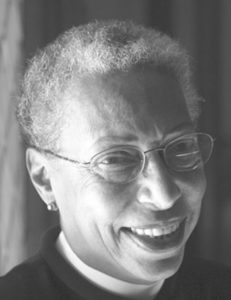
Barbara Harris
On this date in 1930, Barbara Harris, a Black Bishop, was born.
Harris was born in Philadelphia, PA. She attended Saint Barnabas Episcopal Church in her hometown and developed a strong relationship with its vision. She graduated from Philadelphia High School for Girls in 1948 and enrolled in college, but did not complete her coursework. In 1958, a public relations firm, Joseph Baker Associates, hired Harris, believing she had great potential to succeed in this field. Two years later, Harris married. The relationship was short-lived, and she divorced in 1963.
Politically, as a young Black woman, she believed it her duty to be a part of the civil rights struggle. Her participation in Freedom Rides, voter registration, and marches with Dr. Martin Luther King Jr. in Selma, Alabama, focused Harris's attention on fighting injustice and inequality. She went on to work as a chief public relations executive at the Sun Oil Company. Still, she always maintained her interests in the Episcopal Church, religion, and the struggle for justice. Harris's voice increased in the church in 1974 when she lent her support to a group of Episcopal bishops who defied a ban on ordaining women as priests.
Harris became so engulfed in the issue of women's rights in the church that she contemplated becoming a priest herself. By October 1980, her dream became a reality: she was ordained. Harris's early assignments varied from serving as a chaplain in a Philadelphia County prison and working in small parishes to becoming executive director of the Episcopal Church Publishing Company. Harris wrote for the liberal Episcopal magazine “Witness” and began to receive worldwide coverage in the Anglican community.
Her ascension as bishop was a significant event in the religious world. In early August 1988, the Lambeth Conference, the once-a-decade meeting of the international Anglican hierarchy, decided to allow for the ordination of women as bishops in the church, setting the stage for Harris to be elected. Her election in September 1988 as the Episcopal Bishop for Massachusetts created great celebration and turmoil. She defeated many prominent candidates, including other female priests, to achieve her status.
Counter-protests were launched in response to her victory. Several conservative priests revolted, some breaking ties with the church altogether, while top Anglican leaders, such as Robert Runcie, the archbishop of Canterbury, refused to acknowledge female bishops in England. Ecumenical ties between the Roman Catholic Church and the Anglican Church were also strained as the Catholic Church wholeheartedly opposed women entering the priesthood.
Harris, for her part, took the controversy in stride and did not let the spotlight distract her from her mission. Always outspoken, she was willing to battle potential challenges to her election as bishop, a stand that won her the admiration of many of her critics. Once elected and consecrated as a bishop, Harris advocated for diversity in the Episcopal Church and the entire Anglican community.
Her command of a 96,000-member Boston-based diocese made her a powerful force to be reckoned with in deciding church policy and programs. Realizing that with great power came greater responsibility, Harris toned down her rhetoric but did not alter her message. She remains what she always was: an activist critic of the status quo who constantly strives to break new ground. On July 29, 1999, Harris gave a sermon commemorating the 25th Anniversary of the Ordination of Women. There, she lambasted the church's decennial conference at Lambeth, in which the value of allowing women into the clergy was questioned.
She spoke eloquently of the new surge in opposition to women in the clergy and the fight ahead. She was ordained Bishop Suffragan of the Episcopal Diocese of Massachusetts on 11 February 1989. She retired from her post in Boston in 2003. She was succeeded as bishop suffragan by another black woman, Gayle Elizabeth Harris.
Harris then served as Assistant Bishop in the Episcopal Diocese of Washington, D.C., and as president of the Episcopal Church Publishing Company, publishers of "The Witness" magazine. Barbara C. Harris, the first woman ordained bishop in the Episcopal Church and worldwide Anglican Communion, died on March 13, 2020.
An Encyclopedia of African American Christian Heritage
by Marvin Andrew McMickle
Judson Press, Copyright 2002
ISBN 0-817014-02-0